Daily Vocabulary Words: List of Daily Used Words in Leading International Newspapers
Hi there. Welcome to this special section @ Wordpandit.
Our endeavour here is very simple: to highlight important daily vocabulary words, which you would come across in leading newspapers in the country. We have included the following newspapers in our selection:
• The New York Times
• The Washington Post
• Scientific American
• BBC
• The Guardian
• Psychology Today
• Wall Street Journal
• The Economist
We are putting in extensive work for developing your vocabulary. All you have got to do is be regular with this section and check out this post on a daily basis. This is your repository of words that are commonly used and essentially, we are posting a list of daily used words. Hence, this has significant practical application as it teaches you words that are used commonly in leading publications mentioned above.
Visit the website daily to learn words from leading international newspapers.
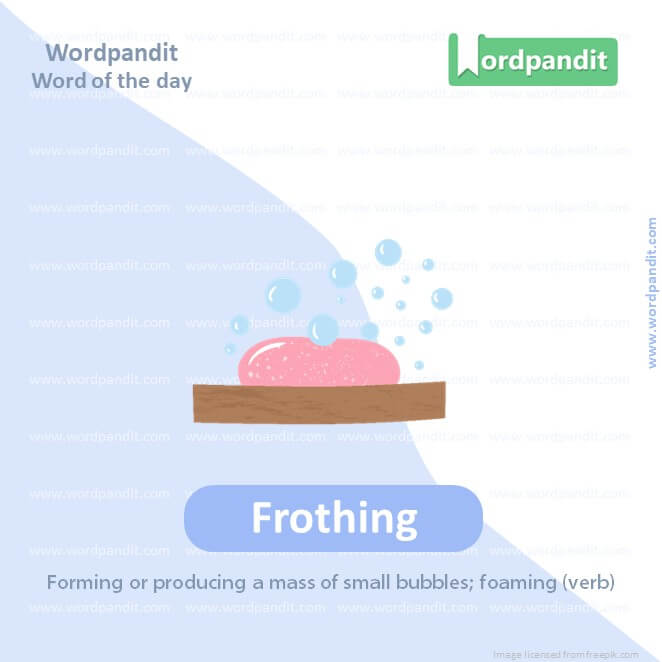
WORD-1: Frothing
CONTEXT: a date that secured its place in history back when members of Maga Facebook groups rushed the seat of US democracy in a frothing rage at everything and nothing.
SOURCE: Guardian
Explanatory Paragraph: Frothing is like when you blow air into your drink through a straw and see lots of little bubbles on top. It means making or becoming full of small bubbles.
Meaning: Forming or producing a mass of small bubbles; foaming (verb).
Pronunciation: FRAH-th-ing
Synonyms: foaming, bubbling, fizzing, effervescing, lathering
Usage Examples:
1. The waves were frothing as they hit the shore.
2. He was frothing milk for the coffee.
3. The dog was frothing at the mouth.
4. The potion began frothing when she added the final ingredient.
WORD-2: Vertebrae
CONTEXT: We arrive in the town, famous for its Bonfire Night, and visit its 15th-century bookshop, which has a ceiling so low I feel at least two vertebrae compress in real time.
SOURCE: Guardian
Explanatory Paragraph: Vertebrae are like the small, round blocks that stack up to make your spine, which helps you bend and twist, and keeps you standing tall. They are the bones in your back.
Meaning: The individual bones that stack up to form the spine in humans and many animals (noun, plural).
Pronunciation: VUR-tuh-bray
Synonyms: spinal bones, backbones, vertebral bones
Usage Examples:
1. The X-ray showed that two vertebrae were fractured.
2. Many yoga positions aim to strengthen the vertebrae.
3. The snake’s vertebrae allow it to bend and twist smoothly.
4. He learned about the vertebrae in biology class.
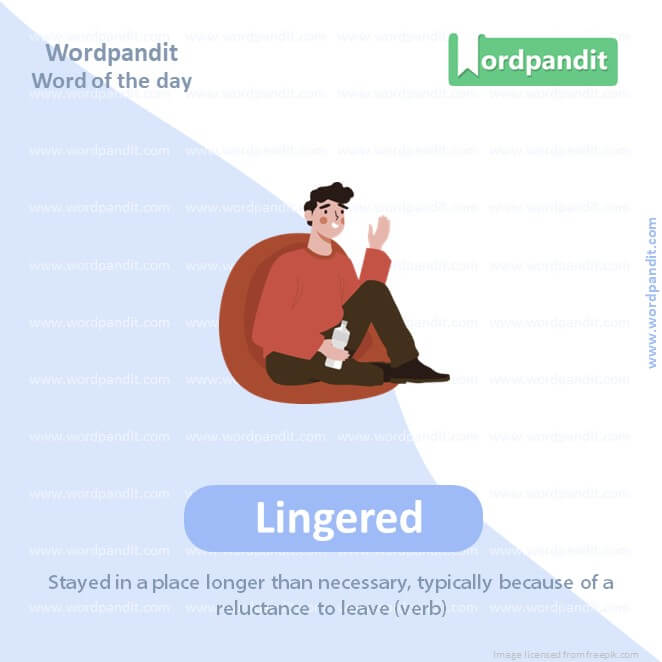
WORD-3: Lingered
CONTEXT: Somewhat controversial and complicated, the proposal has long lingered in policy limbo despite bipartisan congressional backing.
SOURCE: Washington post
Explanatory Paragraph: Lingered is like when you stay in your bed for a little while after waking up because it feels so comfy and you don’t want to leave yet. It means staying in a place longer than necessary because you like it or feel comfortable.
Meaning: Stayed in a place longer than necessary, typically because of a
reluctance to leave (verb).
Pronunciation: LIN-gurd
Synonyms: remained, stayed, loitered, tarried, hovered
Usage Examples:
1. She lingered at the cafe, enjoying her coffee.
2. The scent of flowers lingered in the air.
3. Memories of the day lingered long after it had ended.
4. He lingered in the park, lost in thought.
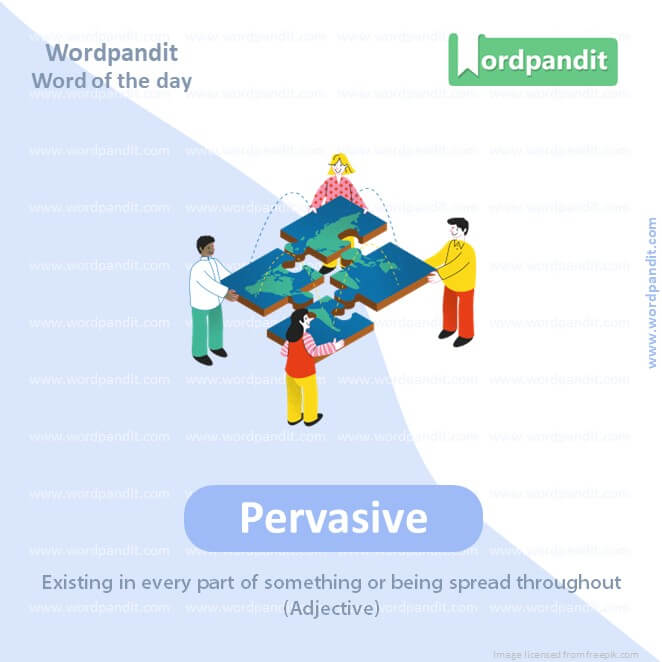
WORD-4: Pervasive
CONTEXT: This ran counter to the narrative she often heard, which was that vaccine misinformation can be so pervasive in a community that the nursing homes simply cannot solve it.
SOURCE: Washington post
Explanatory Paragraph: Pervasive is like when the smell of baking cookies fills up every room in your house, and no matter where you go, you can smell it. It means something that spreads everywhere.
Meaning: Existing in every part of something or being spread throughout
(Adjective).
Pronunciation: per-VAY-siv
Synonyms: widespread, prevalent, ubiquitous, omnipresent, rife
Usage Examples:
1. The pervasive influence of social media is evident.
2. There was a pervasive smell of damp after the flood.
3. Corruption was pervasive in the institution.
4. The music created a pervasive sense of calm.
WORD-5: Strangeness
CONTEXT: Or haven’t since the globe left us dizzy in its new strangeness and coughing became a borderline criminal offence.
SOURCE: Guardian
Explanatory Paragraph: Strangeness is when something is really different or not what you are used to, like if you saw a purple cat. It’s the feeling you get when something doesn’t seem normal or usual.
Meaning: The quality of being unusual or peculiar (noun).
Pronunciation: STRAYNJ-ness
Synonyms: oddity, peculiarity, weirdness, bizarreness, unusualness
Usage Examples:
1. There was a certain strangeness about the old house.
2. He couldn’t ignore the strangeness of the situation.
3. The strangeness of the sculpture intrigued visitors.
4. She felt a sense of strangeness when she returned home after many years.
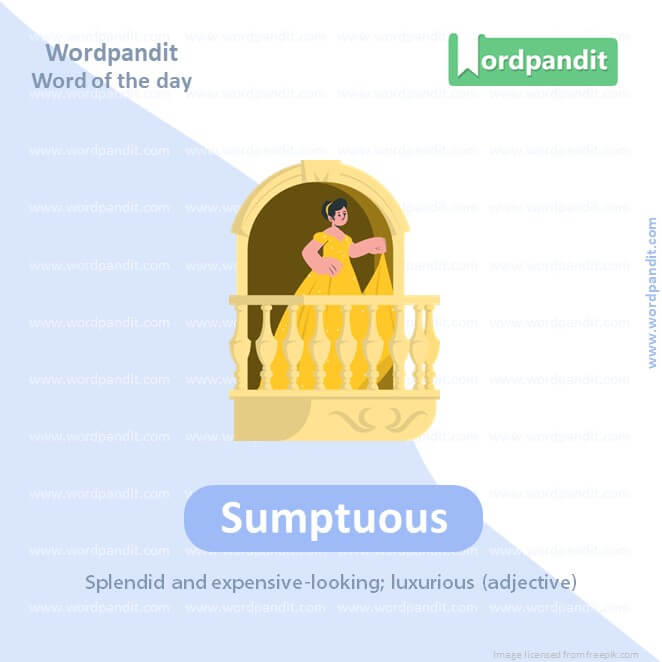
WORD-6: Sumptuous
CONTEXT: On our birthdays we give arrays of gifts, from the silly to the sumptuous.
SOURCE: Guardian
Explanatory Paragraph: Sumptuous is like having a big, fancy feast with lots of delicious food, beautiful decorations, and everything feels very luxurious. It means something is very grand and expensive-looking.
Meaning: Splendid and expensive-looking; luxurious (adjective).
Pronunciation: SUMP-choo-us
Synonyms: luxurious, lavish, opulent, grand, rich
Usage Examples:
1. They were invited to a sumptuous banquet.
2. The room was decorated in a sumptuous style.
3. She wore a sumptuous velvet gown.
4. The meal was sumptuous and satisfying.
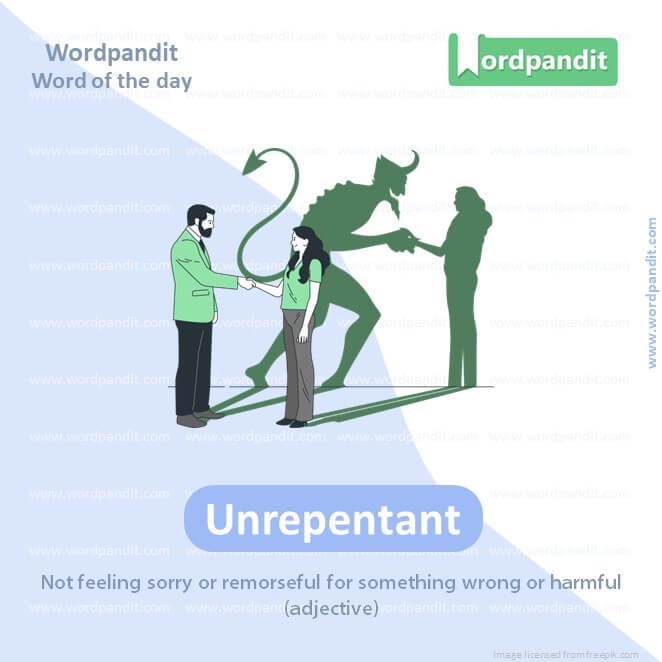
WORD-7: Unrepentant
CONTEXT: I feed her the banana skins. In the farm gift shop, a woman almost trips over the lead of her excitable dog: “Margot, please,” she says, swivelling to look at an unrepentant yorkie.
SOURCE: Guardian
Explanatory Paragraph: Unrepentant is when someone does something wrong but isn’t sorry about it, like if someone took your toy and didn’t give it back or say sorry. It means not feeling or showing regret for one’s actions.
Meaning: Not feeling sorry or remorseful for something wrong or harmful
(adjective).
Pronunciation: un-ri-PEN-tuhnt
Synonyms: remorseless, unashamed, defiant, unapologetic, unabashed
Usage Examples:
1. The thief was unrepentant even after being caught.
2. He remained unrepentant about his decisions.
3. Her unrepentant attitude made the situation worse.
4. The article was an unrepentant critique of the policy.
WORD-8: Swivelling
CONTEXT: I feed her the banana skins. In the farm gift shop, a woman almost trips over the lead of her excitable dog: “Margot, please,” she says, swivelling to look at an unrepentant yorkie.
SOURCE: Guardian
Explanatory Paragraph: Swivelling is like when you spin around in a circle while sitting in a spinning chair. It means turning around quickly and easily, usually around a fixed point.
Meaning: Rotated around a fixed point; turned (verb).
Pronunciation: SWIV-uhl-ing
Synonyms: spinning, turning, rotating, pivoting, twirling
Usage Examples:
1. She was swivelling in her chair out of boredom.
2. The camera was swivelling to capture all angles of the event.
3. He swivelled his head to see who was behind him.
4. The turret on the tank swivelled around.
WORD-9: Excitable
CONTEXT: I feed her the banana skins. In the farm gift shop, a woman almost trips over the lead of her excitable dog
SOURCE: Guardian
Explanatory Paragraph: Excitable is like when you get really, really excited about going to a party or when it’s your birthday. It means getting happy or excited very easily.
Meaning: Easily excited by things; emotionally reactive (adjective).
Pronunciation: ik-SY-tuh-buhl
Synonyms: enthusiastic, lively, energetic, spirited, reactive
Usage Examples:
1. The puppy is very excitable when guests arrive.
2. He’s quite excitable during games.
3. Excitable fans cheered loudly at the concert.
4. She has an excitable nature which makes her fun at parties.
WORD-10: Consonants
CONTEXT: Even with the introduction of more pills with multiple end-of-the-alphabet consonants, I could not stop.
SOURCE: Guardian
Explanatory Paragraph: Consonants are like the pieces in a puzzle that fit together with vowels to make words. In the alphabet, letters like B, C, D, and T are consonants. They help us say and write words by making sounds that aren’t vowels.
Meaning: The letters of the alphabet that represent sounds made by closing or restricting the flow of air through the mouth when speaking (noun, plural).
Pronunciation: KON-suh-nuhnts
Synonyms: non-vowel sounds, speech sounds, phonetic consonants
Usage Examples:
1. The word “stops” has five letters but only four consonants.
2. She practiced pronouncing difficult consonants.
3. English consonants include letters like P, S, and R.
4. He learned to write vowels and consonants in kindergarten.
Vocabulary Grammar
The journey of language mastery is a thrilling blend of words and structure, often referred to as ‘vocabulary grammar’. These critical components of any language work hand in hand to facilitate meaningful communication. However, embracing ‘vocabulary grammar’ requires a nuanced understanding and a strategic learning approach.
The initial step towards understanding ‘vocabulary grammar’ is to study the functionality of words in a sentence. Grammar holds the key to how vocabulary is structured in language. Therefore, observe how words change or influence meaning when placed differently in a sentence.
Leveraging diverse resources is a great way to grasp ‘vocabulary grammar’. Engage with a range of reading materials, audio-visual resources, and interactive language apps. This offers genuine exposure to ‘vocabulary grammar’ in real-world contexts and enhances comprehensive learning.
While learning ‘vocabulary grammar’, it’s important to see vocabulary and grammar as interconnected. Understanding how different parts of speech function can help in the effective usage of vocabulary. Try creating your own sentences using new vocabulary following certain grammatical rules to reinforce learning.
Revision holds its due significance in mastering ‘vocabulary grammar’. Regular review of learnt grammar rules and vocabulary ensures long-term retention and bolsters understanding. Use techniques like spaced repetition to make your review sessions more effective.
Lastly, practicing ‘vocabulary grammar’ is key to cementing your knowledge. Whether it is through writing exercises or conversing in the language, practicing allows you to apply ‘vocabulary grammar’ in a practical context and aids in accurate language use.
In conclusion, understanding ‘vocabulary grammar’ calls for conscious observation, diversified resources, interconnected learning, regular revision, and relentless practice. As you navigate this path, you will see ‘vocabulary grammar’ like two sides of the same coin, both essential to the value it holds in the wealth of language learning.







